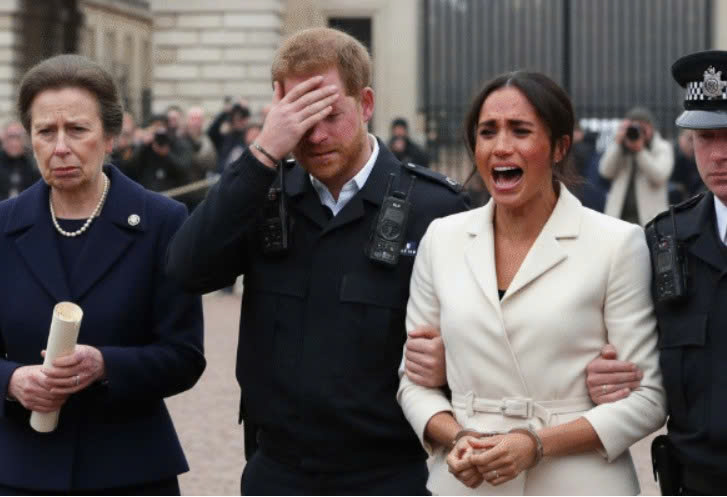Rumors surrounding the royal family have resurfaced once again, stirring public fascination and sparking new debates about what might really be happening behind the palace walls. This time, the focus has shifted toward a supposed private confrontation involving Princess Anne and Meghan Markle—an interaction that, according to insiders, has left both the family and the public buzzing with speculation. While Buckingham Palace has remained silent, the stories circulating have grown increasingly detailed, leaving many wondering what is fact, what is exaggeration, and what reveals the continuing challenges within the modern monarchy.

According to people said to be familiar with the situation, Princess Anne—known across the world for her practicality, her sharp sense of duty, and her lifelong commitment to the institution—reportedly delivered a firm message to Meghan during a private discussion. Those close to the royal household say this conversation was not softened with polite language or diplomatic phrasing. Instead, it was described as straightforward, candid, and deeply rooted in Anne’s belief in tradition and protocol. One source stated, “Princess Anne didn’t mince words. She spoke honestly about her expectations and the importance of respecting longstanding responsibilities tied to the Crown.”
Rumors suggest that this conversation may have influenced Meghan’s participation in a few upcoming royal engagements, particularly those events linked to honoring the late Queen’s legacy. While the palace has not confirmed such decisions, several reports claim that until certain expectations are met, Meghan may be temporarily excluded from specific gatherings. A palace insider summarized Anne’s position as one guided by priorities: “Duty comes first. Princess Anne has spent her entire life upholding the structure and values of the monarchy. For her, keeping the institution stable is more important than personal disagreements or public perception.”
Those close to Meghan, however, paint a different picture. Friends of the Duchess say she feels disappointed and somewhat hurt by what she perceives as a rigid mindset that does not align with her more modern perspective. They claim she believes the royal establishment often misunderstands her intentions and that she has been placed under a microscope more intensely than others. Meghan reportedly feels that speaking openly or advocating for causes she cares about is sometimes misinterpreted as overstepping, when in her view, she is simply continuing the work she values.
Observers who have followed Princess Anne for decades maintain that she is unlikely to shift from her views once they are formed. “Anne has always been decisive,” explained one longtime royal commentator. “She rarely changes course unless there’s a significant reason. She believes deeply in tradition and consistency, and she sees those values as essential to the monarchy’s survival.” This same commentator emphasized that Anne’s leadership style has been shaped by years of responsibility, public service, and a clear understanding of what the Crown represents.
Behind the scenes, palace aides are said to be working diligently to keep the situation calm. The royal household is no stranger to scrutiny, and staff members are aware that even minor disagreements can be magnified when they reach the press. Reports suggest that the team is attempting to manage the narrative, but the media’s constant attention makes it difficult to prevent speculation. As one aide privately shared, “When two strong personalities have different approaches, stories tend to take on a life of their own.”
The contrast between Princess Anne and Meghan Markle—two women who come from entirely different backgrounds and life experiences—has only fueled public interest. One is seen as the embodiment of tradition, shaped by decades within the royal family, while the other represents a more contemporary, outspoken perspective shaped by her own independent career. To many observers, this rumored clash symbolizes the broader challenges facing the monarchy: balancing modern expectations with long-standing customs, and finding harmony between individual expression and institutional identity.
Supporters of Meghan argue that she brings fresh energy and a willingness to address issues that the monarchy has historically approached cautiously. Admirers of Princess Anne counter that her consistency and reliability have helped preserve the stability of the Crown, especially during times of transition and uncertainty. These opposing viewpoints reflect a larger conversation that stretches far beyond the palace gates, touching on tradition, accountability, public roles, and how institutions evolve over time.
Meanwhile, reports hint that Prince Harry has reacted strongly to the rumors involving Meghan, especially suggestions that she may have been unfairly criticized or excluded from certain events. Despite the couple no longer being senior working royals, Harry remains protective of his wife and children, and the idea of tension surrounding Meghan still stirs emotional responses. Some sources claim he views the situation as evidence of lingering misunderstandings within the family. Others suggest he hopes time will soften disagreements and encourage more open communication.
Adding to the swirl of headlines are claims about concerns over Lilibet’s heritage—rumors that have been loudly dismissed by experts and described as misinformation stirred up to inflame public debate. Commentators have urged readers to treat such claims with skepticism, noting that speculation about children—especially those of public figures—is not only irresponsible but potentially harmful. This element of the story has prompted a wider conversation about privacy, respect, and the need to keep unverified claims from being framed as factual.
As with many royal stories, the truth is difficult to pin down. The palace maintains a strict policy of not commenting on private family discussions, leaving the public to interpret the situation through statements from unofficial sources. Yet whether the rumored confrontation is fully accurate or partially dramatized, it serves as a reminder of the intense pressure placed on those who live within—or near—the world’s most famous royal family.
In the end, this unfolding narrative highlights the complex intersection of tradition, personality, public duty, and global attention. For Meghan, the situation may feel deeply personal. For Princess Anne, it is likely viewed as another moment requiring clarity and adherence to expectations. And for the public, it remains a compelling glimpse into the challenges of maintaining unity in a family watched by millions.
As conversations continue, one thing is clear: the fascination with the royal family—and the tension between old-world expectations and modern values—shows no sign of fading anytime soon.





